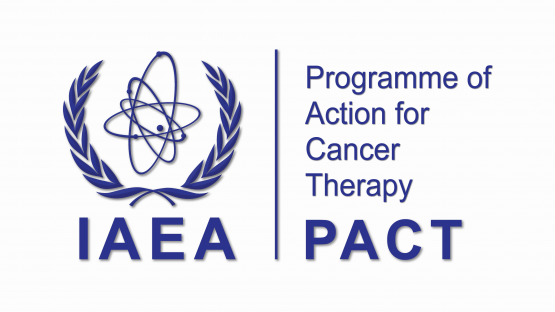Cancer is the one of the major health issues facing the world today. The World Health Organization predicts that by 2020 more than ten million people a year will die of cancer, 70% of them in developing countries. The IAEA's Programme of Action for Cancer Therapy (PACT) was created in 2004 to work with international organisations, governments and the private sector to help combat the growing cancer crisis in the developing world. Since then, PACT has made great strides towards this goal, helping low-income nations to develop and implement national cancer care systems and mobilizing resources.
The 52nd IAEA Annual General Conference provided PACT with the platform to acknowledge the vital role played by Member States and non-traditional donors alike in contributing to its efforts thus far, and to underscore the importance of building momentum and moving forward. Addressing a special PACT event held in the main foyer of the Austria Center Vienna, Werner Burkart, Deputy Director General for Nuclear Applications and Sciences, said such support had helped PACT to develop in a short space of time into a robust programme with international standing, poised to maximize the Agency's contribution to the global fight against cancer.
More than 70 people attended the event, including official representatives of some of PACT's most steadfast supporters. Applauding the contributions of donors both large and small, Mr. Burkart said: “We are humbled by your generosity and dedication to this cause and we thank you. Without your support, nothing is possible. With your support, we hope to show that nothing is impossible.”
Speaking on behalf of one of PACT's biggest donors, the United States of America, Ambassador Marguerita D. Ragsdale, Director,Office of Multilateral Nuclear and Security Affairs, Bureau of International Security & Nonproliferation, praised PACT as an exceptional, necessary initiative, to which the US was proud to provide constant and strong support. In particular, Ms Ragsdale commended PACT's efforts to build public-private partnerships and mobilize non-traditional resources. “The US supports this unique approach,” she said. “Such partnerships are ensuring cancer is placed on the world health agenda.”
A smaller but no less welcome donor, the UN Federal Credit Union Bank, was represented by Ms Lindy Zeiml, who congratulated PACT on its work helping cancer patients around the world. “We all have a moral responsibility and a role to play to help improve the lives of disadvantaged people globally,” she said. The UNFCU's donations benefit PACT's six Model Demonstration Site countries (PMDS).
A newcomer to PACT's growing list of grass-roots donors is the UN Women's Guild (UNWG). Each year the Vienna branch of the UNWG donates some quarter million Euro to small mother-child focused charities around the world. Its decision to donate part of that sum this year to the paediatric ward of the Ocean Road Cancer Institute in Dar-es-Salaam, Tanzania, a PACT PMDS, was warmly welcomed by PACT. The UNWG's donation was graciously accepted by the United Republic of Tanzania's Minister for Communications, Science and Technology, Mr. Peter Msolla.
The PACT special event also heard words of congratulation and support from:
- Mr. Claude Giordan, the Principality of Monaco's Ambassador to the IAEA;
- Mr Shim Yoon-Joe, the Republic of Korea's Ambassador to the IAEA;
- Professor Simon Schraub, President of the French International Cancer Cooperation Network;
- Mr Jose L. De Guzman, Counsellor for Energy, representative of Spain's Mission to the IAEA;
- Mr Giancarlo Kessler, Minister, Deputy Head of Mission, representative of the Swiss delegation to IAEA GC.
In addition, eminent cancer control specialist Professor Robert Burton addressed the gathering. Prof. Burton, who has been associated with WHO for many years and with PACT since 2006, drew attention to the sobering fact that in his own country, Australia, 65% of all women diagnosed with cancer can expect to be cured, whereas in developing countries 90% of those diagnosed with cancer will die. “PACT has a real chance of making a significant difference in a short space of time to people whose needs are great but whose resources are small,” he said. “The broad based support for PACT that we have heard expressed here today, from Member States, government and NGOs, is extremely heartening.”
Massoud Samiei, Head of PACT Programme Office, closed the event by thanking all Member States for their strong support of PACT and the many large and small donors to PACT for their contributions. “PACT is young but dynamic and bold,” he said. “Thanks to the enthusiasm and dedication of staff and experts working for PACT, we have made significant progress. Today, strengthened by your support, we are determined to continue the fight to improve cancer cure and care for those countries and people most in need.”


